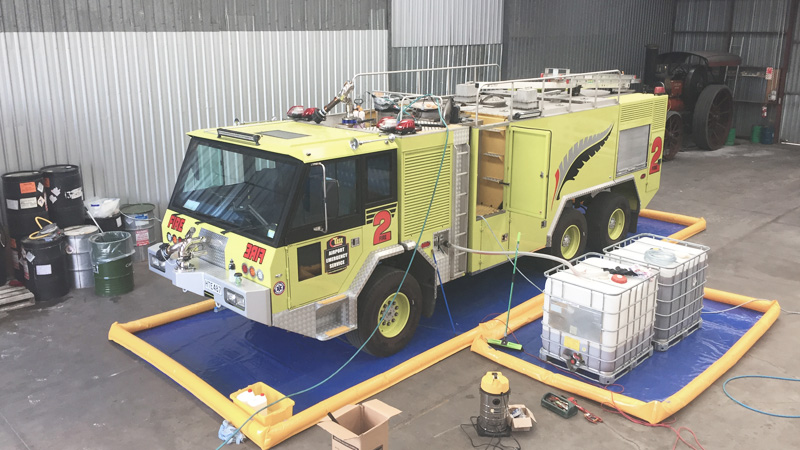Banned firefighting foam cleared from New Zealand airports
Banned firefighting foam stored at three New Zealand airports no longer poses a threat after being safely collected.
Banned firefighting foam has received a great deal of media coverage recently after the discovery of contaminated soil and water at two New Zealand Defense Force bases, and a subsequent investigation finding stores of the foam at several sites.
Task Protection Services (TPS) contracted chemical collection experts 3R Group, which runs the ChemCollect service, to oversee the decanting and decontamination of four appliances from the Palmerston North, Gisborne and Hawke’s Bay airports. 3R was also responsible for ensuring the safe disposal of the material.
According to ChemCollect manager Jason Richards, the process entailed moving the TPS appliances from their base airports to a fit-for-purpose site in Hawke’s Bay as this posed the lowest risk. The enclosed site allowed a fully-controlled work area and also featured bunding mats made specifically for the job.
Appliance availability was a key factor so the appliances were worked on one at a time to avoid having them all out of action at once. Each appliance was also kept out of service until the testing was completed and the green light given to put that appliance back into service.
Decontamination of the appliances involved them being scrubbed, back flushed and steam cleaned, Jason says. “It’s critical the decanted material and rinsate is captured effectively to ensure zero contamination.”
Due to the hazardous nature of the substances, these will be sent offshore for high-heat incineration. “This is best practice for properly disposing of these sorts of contaminated materials.”
Jason says it was a collaborative effort with the removal and decontamination carried out by TPS personnel under supervision of ChemCollect staff. “The decontaminated appliances were refilled with water and samples taken for testing by AsureQuality, with pleasing results.”
“We worked closely with TPS to ensure the whole process ran smoothly,” says Jason, with TPS Managing Director Trevor Reade confirming they were very happy with the result. “This has been a great working relationship.”
In 2006 New Zealand’s Environmental Protection Authority (EPA) banned the importation and manufacture of any firefighting foam which contains perfluorooctane sulfonic acid (PFOA) and perfluorooctane sulfonic acid (PFOS). This was due to their bio accumulative nature and because they are persistent within the environment and in the human body.
In 2011 all products containing PFOS were completely banned and strict controls put in place to manage their storage and disposal.
In 2017 an all-of-Government investigation was carried out following the discovery of soil and water contaminated by PFOS and PFOA at the New Zealand Defense Force’s Ohakea and Woodbourne air bases.
An EPA investigation found the foam at a number of sites across New Zealand, with those in possession of it having since worked to remove it and decontaminate any affected plant. According to Associate Professor Deborah Read, Environmental Health Indicators Programme, Massey University, no public health risk from the foam was found by the EPA investigation.
This is because the equipment which held the foam had been labelled and securely stored. “It is, however, important that this banned substance is safely removed and disposed of to prevent any future exposure of people or the environment,” she says.
3R Group has extensive experience in chemical removal around New Zealand. This includes The Great DDT Muster – a programme with funding support through the Waste Minimisation Fund administered by the Ministry for the Environment. The Muster aimed at ridding New Zealand of banned pesticides containing persistent organic pollutants.
The company’s ChemCollect services operate nationwide, safely collecting and disposing of unwanted, expired or banned chemicals, including unknown liquids and powders, from a range of industries.







